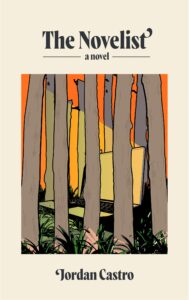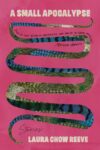
[Soft Skull; 2022]
The title of Jordan Castro’s The Novelist: A Novel captures the joke that drives his fiction: it self-reflexively examines the novel form, even as it eschews so many things that might typically bring us to novels. In terms of plot, The Novelist unfolds over a single, present-day morning during which Castro’s unnamed protagonist muses on the novel(s) he will write, and in the process, does all the things writers do when they’re not writing, when they’re failing to write, and when they’re finally writing: surfing the internet, making coffee, walking the dog, taking a shit, not necessarily in that order.
Amid this procrastination, Castro wedges a gimmick, in the form of a character named Jordan Castro who is also an author but emphatically not the protagonist. The character Jordan Castro is idol rather than avatar (“he would tweet something so compelling and strange I might spend a whole hour considering it,” the protagonist admits). The dissonance between a protagonist and a character with the author’s name is a familiar way to generate novelistic complexity (see, for example, the 20th century), and this autofictional conceit provides something like form to The Novelist’s plotless morning: as the novelist-protagonist fails to finish his novel, he also fails to become novelist Jordan Castro (character), even as he paradoxically is novelist Jordan Castro (author), writing a book that may well be The Novelist: A Novel, which we readers can now see, has a copyright page bearing the name “Jordan Castro.”
But The Novelist: A Novel excels in ways other than this conceptual premise; the novel features exquisite moments that blend vivid description with abject, ridiculous situations. Nobody writes ass-wiping like Jordan Castro (author not character):
So, I made sure to apply pressure carefully while wiping, once, from front to back; my legs buzzed as I leaned forward, my thighs pressing into the rounded edge of the seat; the nerve endings in my hamstrings sent vibrations through my legs, up through my arms, then briefly to my face; my entire body microscopically quivered for one or two seconds. I checked.
Whereas literature’s most famous toilet scene, near the beginning of James Joyce’s Ulysses, initiates an intricate, book-length play with symbolism, Castro’s shit immerses readers in the visceral experience of the present. He extends this thorough description to other moments, as his prose reveals the intricacies of shame and abjection in everyday life, where the protagonist scrolls through Instagram feeds of vague acquaintances, reflects on past mistakes, and fails to write his novel.
The present is where Castro relishes his attention, but it’s a present layered with memory and subjectivity. His detailed evocation of physical, personal experience, melded with a metafictional conceit, situates his book under the umbrella of autofiction, which dwells in the immediate experience of everyday life to reveal the constructedness of any attempt to represent reality. In this regard, Castro’s novel also resembles some successful versions of the “internet novel,” such as Patricia Lockwood’s No One is Talking About This and Lauren Oyler’s Fake Accounts. These novels succeed, in their deployment of realist techniques to represent, as Ryan Ruby puts it, the “situation that exists on a site like Twitter, rather than merely imitating its look or feel.” Castro’s novel evokes this situation through his description’s vivid physicality: “I opened my laptop, still waiting for my morning tea to steep, and tried to type my password three times rapidly before getting it right, my waking fingers clacking with the determination of a machine.” The internet’s unprecedented connectivity pushes us into ourselves, even as we are isolated, fiddling with the wifi and writing our little novels. James Webster argues that the knowledge form of the internet novel is not the fragment, but the wikipedic deluge of information that compels us to think in new ways, recalling something we know to be true without being able to remember where we learned it.
This unlocatable recall captures the experience of knowledge in The Novelist: A Novel. At this point, Castro folds in yet another genre — the addiction narrative. Drawing on the insights of Michael Clune’s White Out (Clune is quoted and alluded to in the book, which he also blurbs) and his claim that “addiction is a memory disease,” Castro’s protagonist obliquely reflects on his past heroin addiction and recovery, which he dramatizes in his novel. Here is his intervention into fictional form, as he realizes, “Writing fiction is a memory disease, I thought stupidly. Writing my novel had likely changed my memory, though, I considered, since I focused on certain details and didn’t include others, then looked at and edited them a lot; I probably accidentally invented details too.” The addiction novel, the internet novel, autofiction: these are all genres that modulate detail vis-à-vis memory, whether the diseased memory of the addict, the deluged memory of the tweeter, or the disavowed memory of the authorial subject.
This genre-compaction befits the scale of something that appears under the title of The Novelist: A Novel. There is a compelling formal unity to the book, as it shows how fictional works always partake of multiple genres simultaneously; a character thinks they’re living in a comedy, only to find tragedy on every page. The novel as a form possesses the capacity to sediment multiple disparate genres within a few chapters, a few 100 pages, producing the thing that we call A Novel.
But this novelistic form works in tension with the book’s dedication to its autofictional conceit. In a move similar to what Ruby identifies in Oyler’s Fake Accounts, Castro anticipates his novel’s inevitable circulation to readers and critics like myself. Whereas Oyler incorporates the social situation of social media by diffusing the vagaries of possible readerly opinions, Castro opts for bravado, challenging the literary scene:
This was what the literary world did now, I’d reminded myself, they celebrated stupid novels for stupid reasons. Every novel . . . failed as a novel, but since no one wanted to read novels, no one noticed, and instead of despairing over the failed state of our literary culture, they rejoiced, like madmen deliriously bashing their heads into the wall . . . Every review focused on something other than its novelistic qualities: it was a political, historical, or sociological document; it was a philosophical treatise, and so on. What was the point of literature, I’d wondered, if it could only ever be something else?
The novel is full of these self-conscious reflections on the status and craft of fiction (much of the narrative follows the protagonist reworking the perspective and tense of his novel-in-progress). This statement, along with the emphatic nature of the title, suggests that The Novelist: A Novel should indeed be evaluated as, well, a novel.
Castro’s narrator works out these tensions, in part, through his fascination with the character Jordan Castro, who has been condemned by a reading public that collapses his novel’s representations of “toxic masculinity” into his purported toxicity as such. “Many on Twitter,” the protagonist notes, “began to ascribe certain qualities not just to the narrator but to Jordan Castro himself, such that the difference between Jordan Castro and his narrator were flattened into an indistinguishable sameness, composed of troublingly contagious abstractions.” True, a representation of something is not the same as that thing itself (a reminder that seems necessary), but the question this particular novel poses is not whether this idea is correct, but who exactly holds it. The Novelist: A Novel narrates everything through the perspective of its protagonist, crucially distinct from Jordan Castro, the character. Whereas the traditional novel of ideas refracts ideas dialogically between characters, Castro repackages its already gimmicky form and uses his monologic protagonist — who is both Jordan Castro, the author, and not — to simultaneously claim and disavow the ideas of the protagonist. Near the end of The Novelist: A Novel, the narrator walks his dog and reflects on his anxiety about the novel he will write. “It was, after all, just a novel,” he thinks, “The fact of its being fiction would grant me the freedom to be wrong. As long as it was written well . . .” (ellipsis in original). This “freedom to be wrong” resolves the protagonist’s anxieties about the character Jordan Castro’s vilification. Perhaps that is the point of fiction here: to put unpopular ideas in the voices of characters that the author doesn’t have to stand behind, so long as the book is written well. There’s a certain seduction to this idea, but I also feel that it’s an impoverishment of fiction. Is fiction just life that you can get wrong? Fiction is also a place to inhabit bizarre and impossible situations, to model ways that society has been and could be, to plumb the depths of the unconscious, to offer an exquisite depiction of a room or a vase, to write extended descriptions of wiping your ass. And in addition to all that, it can be written well.
Jordan Castro writes well. Across his debut novel, he demonstrates technical skill, able to mingle genres and details into compelling and pleasurable prose. In the process, he reveals that — even if his protagonist doesn’t know it — there is so much more to a novel than autofictional backflips or life that you can get wrong.
Adam Fales is a PhD candidate at the University of Chicago and editor of Chicago Review. His writing has also appeared in Avidly, Los Angeles Review of Books, Homintern, Public Books, and Debutante Army.
This post may contain affiliate links.







